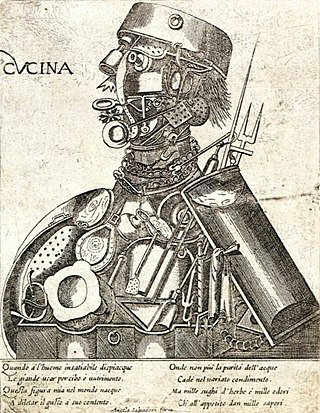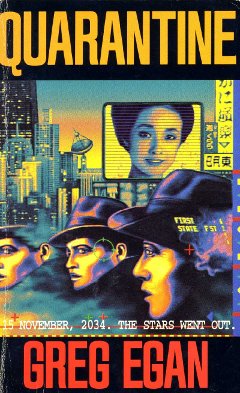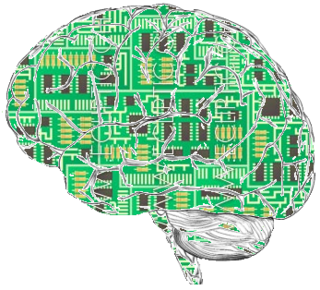
The Chinese room argument holds that a digital computer executing a program cannot have a "mind", "understanding", or "consciousness", regardless of how intelligently or human-like the program may make the computer behave. The argument was presented by philosopher John Searle in his paper "Minds, Brains, and Programs", published in Behavioral and Brain Sciences in 1980. Similar arguments were presented by Gottfried Leibniz (1714), Anatoly Dneprov (1961), Lawrence Davis (1974) and Ned Block (1978). Searle's version has been widely discussed in the years since. The centerpiece of Searle's argument is a thought experiment known as the Chinese room.
Greg Egan is an Australian science fiction writer and mathematician, best known for his works of hard science fiction. Egan has won multiple awards including the John W. Campbell Memorial Award, the Hugo Award, and the Locus Award.

Mind uploading is a speculative process of whole brain emulation in which a brain scan is used to completely emulate the mental state of the individual in a digital computer. The computer would then run a simulation of the brain's information processing, such that it would respond in essentially the same way as the original brain and experience having a sentient conscious mind.
A brain transplant or whole-body transplant is a procedure in which the brain of one organism is transplanted into the body of another organism. It is a procedure distinct from head transplantation, which involves transferring the entire head to a new body, as opposed to the brain only. Theoretically, a person with complete organ failure could be given a new and functional body while keeping their own personality, memories, and consciousness through such a procedure. Neurosurgeon Robert J. White has grafted the head of a monkey onto the headless body of another monkey. EEG readings showed the brain was later functioning normally. Initially, it was thought to prove that the brain was an immunologically privileged organ, as the host's immune system did not attack it at first, but immunorejection caused the monkey to die after nine days. Brain transplants and similar concepts have also been explored in various forms of science fiction.
Artificial consciousness (AC), also known as machine consciousness (MC), synthetic consciousness or digital consciousness, is the consciousness hypothesized to be possible in artificial intelligence. It is also the corresponding field of study, which draws insights from philosophy of mind, philosophy of artificial intelligence, cognitive science and neuroscience. The same terminology can be used with the term "sentience" instead of "consciousness" when specifically designating phenomenal consciousness.

Permutation City is a 1994 science-fiction novel by Greg Egan that explores many concepts, including quantum ontology, through various philosophical aspects of artificial life and simulated reality. Sections of the story were adapted from Egan's 1992 short story "Dust", which dealt with many of the same philosophical themes. Permutation City won the John W. Campbell Award for the best science-fiction novel of the year in 1995 and was nominated for the Philip K. Dick Award the same year. The novel was also cited in a 2003 Scientific American article on multiverses by Max Tegmark.

Hackers is an anthology of science fiction short stories edited by Jack Dann and Gardner Dozois. It was first published in 1996. It contains stories by science fiction and cyberpunk writers of the late 1980s and early 1990s about hackers.

Quarantine is a 1992 hard science fiction novel by Greg Egan. Within a detective fiction framework, the novel explores the consequences of the Copenhagen interpretation of quantum mechanics, which Egan acknowledges was chosen more for its entertainment value than for its likelihood of being correct.
Brain implants, often referred to as neural implants, are technological devices that connect directly to a biological subject's brain – usually placed on the surface of the brain, or attached to the brain's cortex. A common purpose of modern brain implants and the focus of much current research is establishing a biomedical prosthesis circumventing areas in the brain that have become dysfunctional after a stroke or other head injuries. This includes sensory substitution, e.g., in vision. Other brain implants are used in animal experiments simply to record brain activity for scientific reasons. Some brain implants involve creating interfaces between neural systems and computer chips. This work is part of a wider research field called brain–computer interfaces.
An artificial brain is software and hardware with cognitive abilities similar to those of the animal or human brain.

The Ware Tetralogy is a series of four science fiction novels by author Rudy Rucker: Software (1982), Wetware (1988), Freeware (1997) and Realware (2000).

Many of the tropes of science fiction can be viewed as similar to the goals of transhumanism. Science fiction literature contains many positive depictions of technologically enhanced human life, occasionally set in utopian societies. However, science fiction's depictions of technologically enhanced humans or other posthuman beings frequently come with a cautionary twist. The more pessimistic scenarios include many dystopian tales of human bioengineering gone wrong.

Mind uploading, whole brain emulation, or substrate-independent minds, is a use of a computer or another substrate as an emulated human brain. The term "mind transfer" also refers to a hypothetical transfer of a mind from one biological brain to another. Uploaded minds and societies of minds, often in simulated realities, are recurring themes in science-fiction novels and films since the 1950s.
William Hirstein is an American philosopher primarily interested in philosophy of mind, philosophy of language, metaphysics, cognitive science, and analytic philosophy. He is a professor of philosophy at Elmhurst University.
Neuroanthropology is the study of the relationship between culture and the brain. This field of study emerged from a 2008 conference of the American Anthropological Association. It is based on the premise that lived experience leaves identifiable patterns in brain structure, which then feed back into cultural expression.The exact mechanisms are so far ill defined and remain speculative.

An isolated brain is a brain kept alive in vitro, either by perfusion or by a blood substitute, often an oxygenated solution of various salts, or by submerging the brain in oxygenated artificial cerebrospinal fluid (CSF). It is the biological counterpart of brain in a vat. A related concept, attaching the brain or head to the circulatory system of another organism, is called a head transplant. An isolated brain, however, is more typically attached to an artificial perfusion device rather than a biological body.
Digital immortality is the hypothetical concept of storing a person's personality in digital substrate, i.e., a computer, robot or cyberspace. The result might look like an avatar behaving, reacting, and thinking like a person on the basis of that person's digital archive. After the death of the individual, this avatar could remain static or continue to learn and self-improve autonomously.
Simulated consciousness,synthetic consciousness, etc. is a theme of a number of works in science fiction. The theme is one step beyond the concept of the "brain in a vat"/"simulated reality" in that not only the perceived reality but the brain and its consciousness are simulations themselves.

Consciousness after death is a common theme in society and culture, and the belief in some form of life after death is a feature of many religions. However, scientific research has established that the physiological functioning of the brain, the cessation of which defines brain death, is closely connected to mental states.

Connectome: How the Brain's Wiring Makes Us Who We Are (2012) is a book by Sebastian Seung. It introduces basic concepts in neuroscience and then elaborates on the field of connectomics, i.e., how to scan, decode, compare, and understand patterns in brain connectivity. The book concludes with musings on cryonics and mind uploading. It was selected by The Wall Street Journal as Top Ten Nonfiction of 2012.











